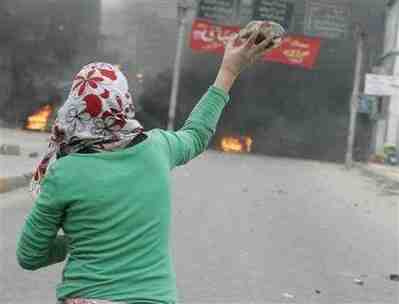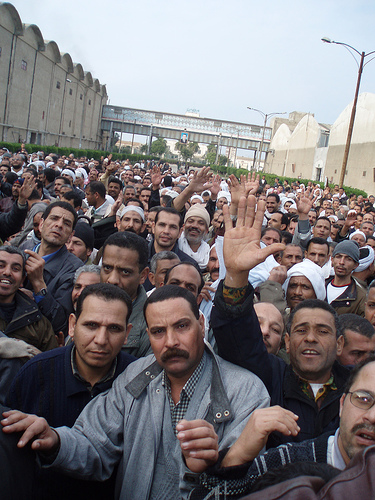
Hosni gets a face lift
The Mubarak regime has been facing a rising strike movement in recent years. Similar developments have been happening in Iran. However, in Egypt, middle class grievances have been merging with the growing workers movement and combining with the protests against the regime in its alliance with US imperialism. Currently, the growing frustration with inflation, such as the rising cost of bread, as a result of world-wide rise in commodity prices, the mass arrest of hundreds of Muslim Brothers candidates and other opposition parties leading up to the recent elections, the deepening of neoliberal restructuring of the economy, the deepening of privatization of industries, casualization with the growth in temporary labor contracts, massive corruption and the strengthening of Israeli apartheid and the continuing occupation of Iraq is taking on the character of a wide-ranging political movement to bring down the Mubarak dictatorship. However, state terror has been effective before in preventing such democratic movements from cohering and Egyptian activists are routinely arrested and tortured.
And this is exactly what has been happening. Much of the leadership of the strike, along with a leader of Kefaya, and several well-known bloggers have been arrested and many of them have been tortured. The regime's attempt to occupy the factories and smash the student solidarity demonstrations in Cairo led to tens of thousands fighting back in the streets these last few days. Knowing that elections are a sham, and paralleling a call by the Muslim Brothers for a voter boycott, turnout for the most recent local elections has been estimated at 3%. While the U.S. and British rulers prop-up the dictatorship with billions of dollars in what they say is their fight for democracy, its legitimacy is near zero with its foundations being pulled at brick by brick with the hands of the working and middle classes alike.
To read the NYTimes or Washington Post you would think only when Egyptian bloggers "insult Islam" are they jailed by the regime.

Since the early 1990s, the Egyptian government has embarked on a process of neoliberal restructuring involving the selling off of state-owned industries, the introduction of temporary labor contracts or casualization, reduction of subsidies for staples, and cut back on social services. It is a process familiar to the U.S. and around the world that has defined the political climate and social policy for the last 30 years. While street protest against the government, centered around student activity, has been developing since 2002 with the outbreak of the second Palestinian Intifada, the center of strike activity began in the textile industry in earnest in 2006 and spread quickly from there.
During the 1919 revolution in Egypt the liberal elite Wafd Party rode the rebellion of working people to power, negotiating a deal with British colonial occupation and smashing the early democratic organizations of the workers that were decisive in winning the qualified independence of 1923. The anti-democratic Wafd was politically dependent on British imperialism, the importation of British capital, and the British-installed monarchist stooge. The situation is no different from the liberal elites promoted by today's "progressive" imperialists. Textiles have been a major industry in Egypt going back to the 1930s and 1940s and it was textile workers who played a major role in finally running the Wafd elites out of power.
The rise to power of the radical nationalist Nasser saw the break with British and American imperialism. Nasser and his Revolutionary Command Council, or Free Officers, consolidated their power not by smashing the Egyptian working classes' organizations, but by incorporating them into intense state-capitalist development and support from Soviet capital. Like the New Deal in the U.S. or the British Labor Party in Britain, this resulted in the creation of new "progressive" labor law, subsidies and other benifits and compensation. These state-capitalist concessions were made possible through the destruction of any independent political power of Egyptian workers and the incorporation of a union bureaucracy that would help guarantee labor quiet. Once again, working people found a new regime of exploitation.
By the late 1970s the Nasserist state was seeing the first signs of being dismantled. By the 1990s neoliberal political and economic policies had taken fully hold in Egypt, a world-wide phenomenon. The union bureaucracies of the old Nasserist state have helped this neoliberal bonanza for the rich by ensuring that the roots of the Mubarak regime continue to wrap around and strangle any independent democratic movement in Egyptian industry. Egypt is just one more example of how the only relation in today's ruling class ideology to "democracy" (pimped in the NYtimes and flying on the wings of imperialism and "economic reforms") is making sure it doesn't exist.
The strikes of the last two years have been the center of gravity of the movement that has spread out across other industries, including the growing privatized industries, combining with the student movement, and embracing the middle class professional associations, with college professors and doctors going out on strike, and much of the civil service, whose salaries are not keeping up with inflation.

For more check out this interview with Hossam el-Hamalawy and this interview with Hossam el-Hamalawy and Rabab el-Mahdi.



